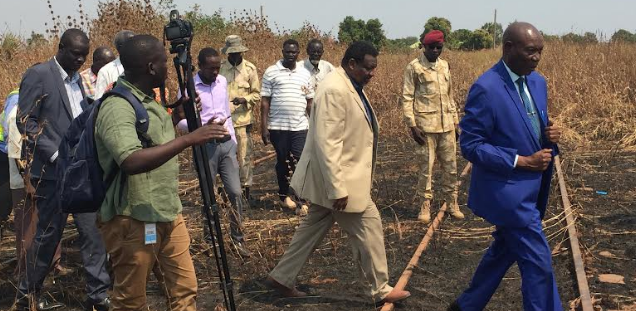A delegation from the Al- Basim Railway Company from Sudan arrived in Western Bahr el Ghazal State earlier this week to assess and commence rehabilitation works on the railway line connecting South Sudan and Sudan.
The group, led by the company’s general manager Abdel Salam Marki Ahmed, visited Wau railway station on Tuesday.
Addressing the press at the station, Ahmed said his visit was to assess the railway line after his company recently signed a memorandum of understanding on the resumption of railway transport with the South Sudan government.
“Our visit is to study the resumption of railway transport between Sudan and South Sudan and to assess the line,” Ahmed said. “The long suspension has badly affected the infrastructure of the railway line.”
He added: “What we are seeing is that the line needs heavy renovation in the infrastructure, we have signed the deal with the government of South Sudan on the renovation and the team will start the work at the beginning of next year.”
For his part, the Western Bahr el Ghazal State roads minister, Muhamaden Abubakar Muhamaden, said the rehabilitation of the railway is a national project because the president and the national minister of the transport signed an agreement with Sudan.
“This is a national program because the president and the national minister of transport signed the deal with neighboring Sudan and we are now implementing the agreement,” Minister Muhamaden said. “Our guarantee to the company is that security is in place and any local assistance that the company needs will be provided by the state government.”
State government orders squatters to vacate railway land
Relatedly, the ministry of housing, land, and public utilities in Western Bahr el Ghazal State ordered squatters illegally occupying railway land to immediately vacate or face being forcefully ejected.
Angui Julu Angui, the state minister of housing, lands, and public utilities, said,
“We have ordered the civilians who built homes in the area of sika hadid (railway) to leave,” Minister Angui ordered. “I as the lands minister do hereby order those with homes near the railway to leave the area from today (Tuesday).”
However, the order to vacate did not give a provisional period for the residents to leave and some who spoke to Radio Tamazuj said they should be first be compensated and or given land to resettle.
Orasio Udog Madut, an affected squatter said, “If the government says people have to leave, we need to be relocated because we do not have where to go.”
Santino Deng Ariath, another illegal squatter said the children residing in the railway land are children of soldiers who were deployed to frontlines during the war most of who have not returned.
“The children staying in this area are children of soldiers and these soldiers have been taken to the frontlines and some did not return back and their children have remained here,” Deng said. “Give us time. We do not have money to go and rent.”
Mary Nyobol said she has lived on railway land for the last nine years and has nowhere to go.
“We have nine years here at the railway site. Some women lost their husbands during the war and have been looking after their children here as widows,” Nyibol pleaded. “Give us time and also allocate us alternative land. Let it be next year. The allocation of alternative land should come first and vacation later.”
The railway ceased operation during the Sudanese civil war in 1991 and briefly resumed operations in March 2010 when it was officially reopened by former Sudanese President, Omar Al Bashir. It was then closed again in 2011 after South Sudan seceded.




